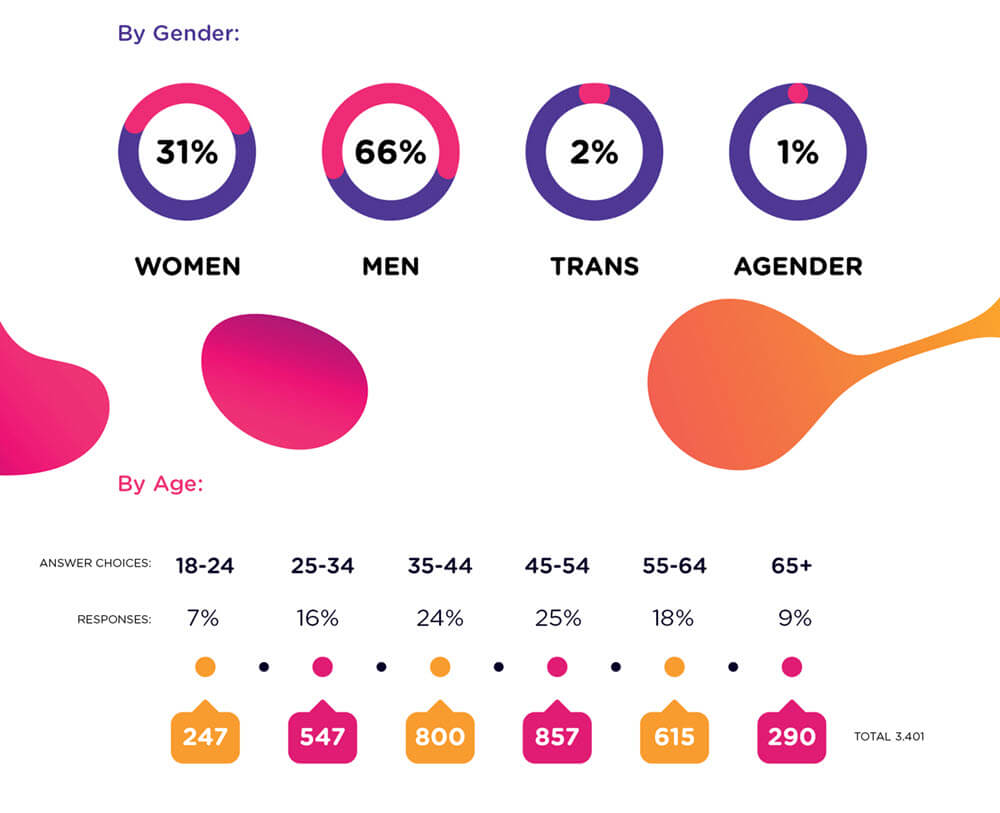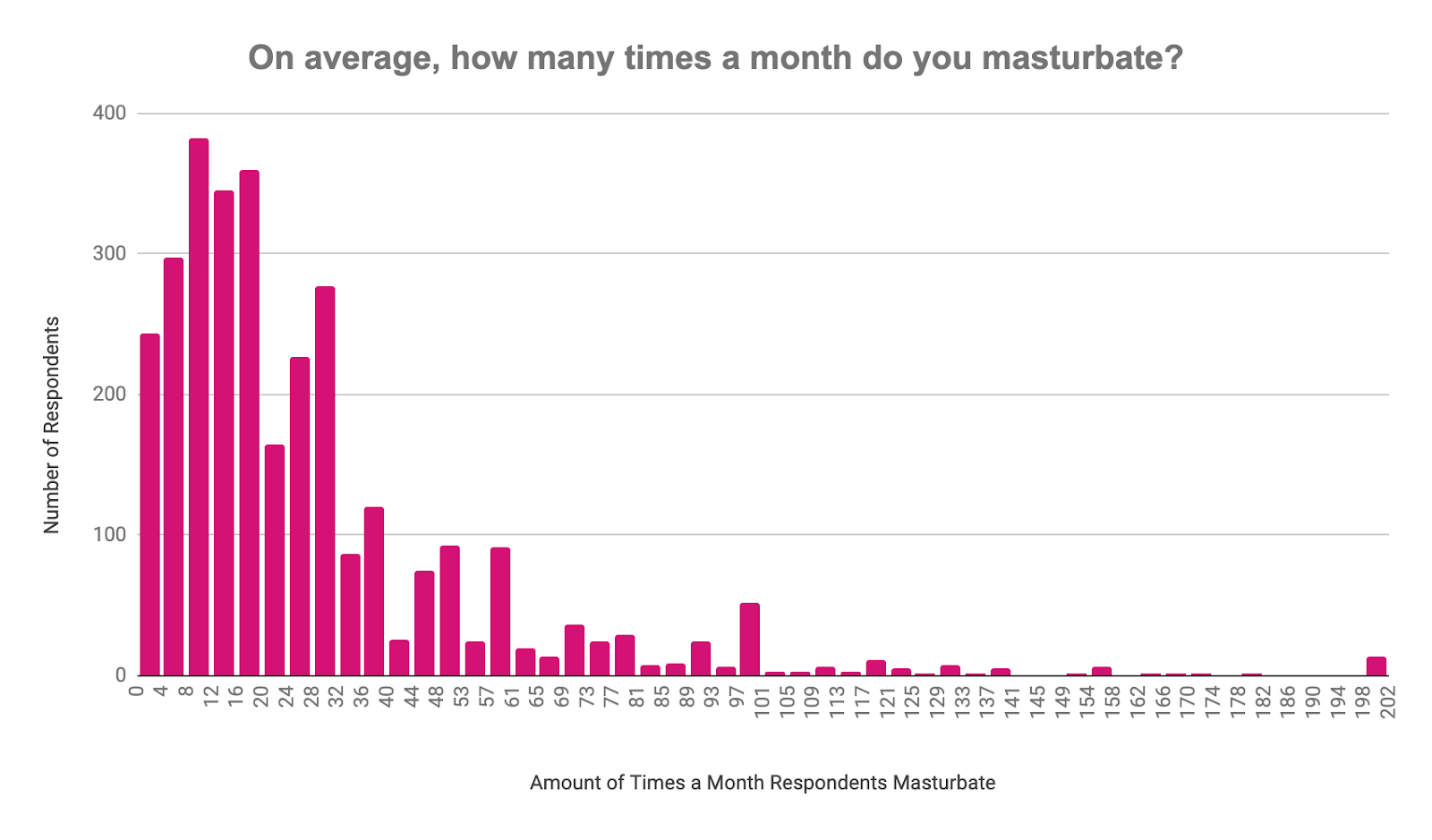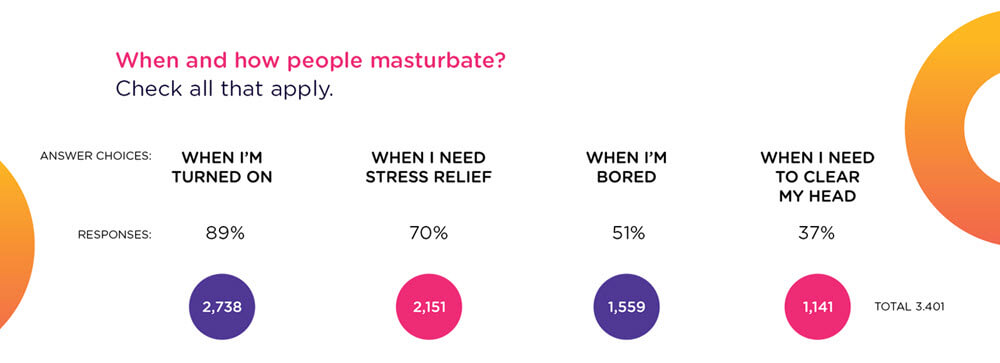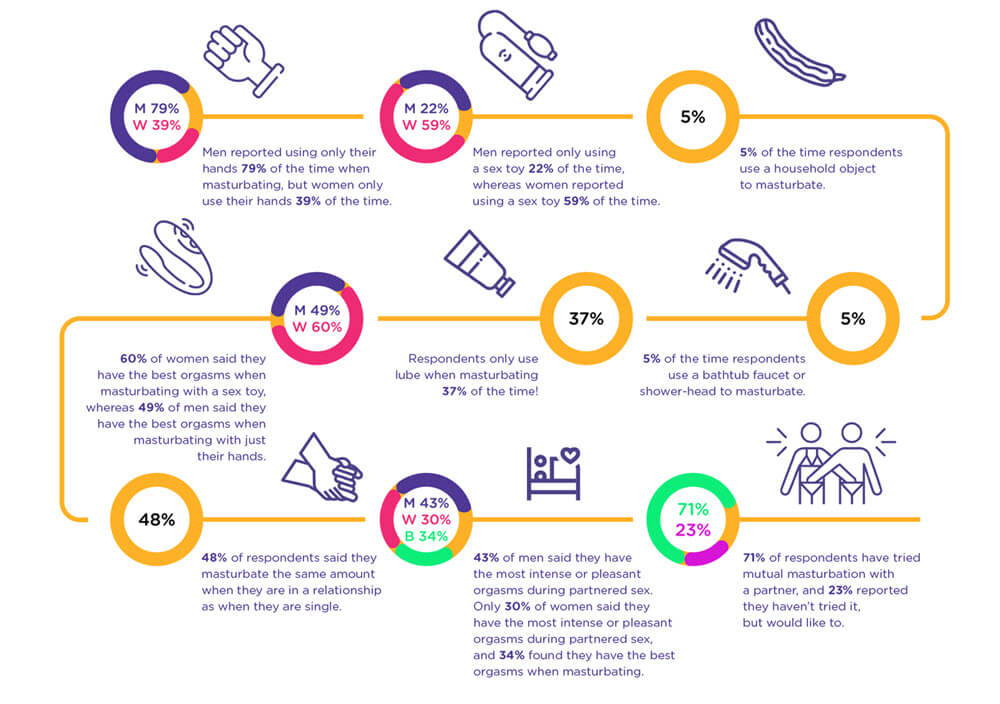Happy Masturbation May! In case you’re unaware, May is International Masturbation Month, an entire month dedicated to celebrating self-pleasure. At Kinkly, we love Masturbation May. Not only is it one of our biggest and busiest months of the year, its mission is also near and dear to ours: to promote and celebrate self-pleasure.
The reality, though, is that not everyone’s celebrating. Although sex education and sexual wellness have made leaps and bounds in the mainstream media over the past few years, masturbation is still a topic many people aren't comfortable talking about. And there are still stereotypes and taboos around masturbation that frame it as shameful, unhealthy or inappropriate for those in a relationship.
As a result of this taboo, masturbation is also a topic (like many surrounding sexual health) that lacks a lot of data. Besides TENGA’s yearly Self-Pleasure Report, some of the best surveys and research on masturbation habits are from the early 2000s (see sources below). While a lot of questions around masturbation can be subjective, the fact that only a few search results contain actual hard data to common questions around masturbation is disappointing.
This is data that should exist.
Thus, we decided to fill the hole ourselves (pun very much intended!) We created a survey and asked our incredible readers all about their masturbation habits. We wanted to learn more about people's masturbation routines, practices and viewpoints. In the end, Kinkly's Self-Pleasure Survey gathered results from 3,401 respondents who told us all about their masturbation habits, routines and preferences.
Not only does data help us understand sex and human sexuality better, it also helps us understand ourselves. After all, many of the questions we get at Kinkly are really just people asking “Is this OK?” or “Am I normal?” If the results of our survey show anything, it’s that most of the questions present a wide range of answers.
Many of the questions we get at Kinkly are really just people asking “Is this OK?” or “Am I normal?” If the results of our survey show anything, it’s that most of the questions present a wide range of answers.
Curious about other people’s self pleasure? Here are the results of our survey.
[Editor’s Note: Due to the small number of trans, agender and asexual respondents, we were not able to draw any statistically significant conclusions for these groups as we did not have an accurate representation of the population. To avoid bias, we have only drawn conclusions for men and women and by relationship status.]

When We Started Masturbating
We weren’t surprised to learn that most people started masturbating in their teens. What stood out from the data, however, is how many women started exploring considerably later.
Sixty-five percent of our respondents reported that they started masturbating between the ages of 10 and 15. While 75 percent of men reported starting masturbating between the ages of 10 and 15, less than 2 percent of men reported starting masturbating later than 20 years old. However, many more women reported starting masturbating later in life. While 46 percent of women also started masturbating between the ages of 10 and 15, a full 20 percent started between 16 and 20; 7 percent between 21 and 25; 3 percent between 26 and 30; and 4 percent after the age of 31.
So, while the majority of men and women start masturbating in their early youth, our results showed that many women don’t start exploring self-pleasure until later in their life.
“I think it’s unfortunate that many women are discouraged from masturbation, while men are conversely encouraged. Stereotypes, which I feel are practically prehistoric, deem masturbation a rite of passage for young men. Unfortunately, most cultures believe women should remain sexually pristine and don’t positively encourage women to find out more about personal pleasure and intimate exploration,” sexologist Dr. Sunny Rodgers said.
"Unfortunately, most cultures believe women should remain sexually pristine and don’t positively encourage women to find out more about personal pleasure and intimate exploration."
How Often We Masturbate
We can now provide an answer to the previously unanswered “how often do people masturbate” query. According to our respondents, we masturbate an average 29 times a month! In other words, many of us are dedicating time to explore our self-pleasure almost every day. We don’t blame you - masturbation has been shown to be a way to relieve stress, and even boost mood and improve sleep. Men reported masturbating on average 29 times a month, whereas women reported masturbating 26 times a month.

If you masturbate much more, much less or even not at all, don’t worry. These are just averages, and they actually represent a whole wide range of actual experiences, experiences that may shift depending on people’s health and happiness. Every person has different levels of libido as well as life factors that affect it.
Masturbation by Age
There are lots of assumptions around masturbation and age. Our data shows that people across age groups are doing it - and probably more than you might imagine.
Our youngest respondents (18 to 24 years old) reported masturbating the most, at 33 times per month. That number decreased as the age of respondents increased, with respondents older than 65 masturbating, on average, 23 times a month. That's still quite a regular habit! Clearly, masturbation and self-pleasure remain important for people across the age spectrum.
Masturbation by Relationship Status
There is a common myth that people masturbate less when they are in a relationship. It goes hand-in-hand with the stereotype that masturbation is only for those who “can’t have real sex” (more on that later!) Our results show that while people in long-term partnerships, marriages or monogamous relationships may masturbate less, it is not significantly less.
“I believe that people in long-term relationships may masturbate less due to having an available sex partner always at hand. Although, it may actually be attributed to the fact that privacy and time alone to masturbate may be harder to find with your partner always underfoot,” Rodgers told us.
Single people and those with casual sexual partners reported masturbating the most at 35 times per month. Those in open relationships reported masturbating 33 times per month and those in polyamorous relationships reported masturbating 31 times per month. People in monogamous relationships reported masturbating 26 times a month, and people in marriages or with long-term partners reported masturbating 24 times a month. The results show that regardless of relationship type or status, self-pleasure and exploration remains a key part of many people's sexual habits.
Masturbation by Sexual Orientation
Our survey showed that gay respondents masturbate the most at an average of 39 times per month. Other groups weren't far behind, though. Bisexuals reported masturbating on average 33 times a month, and straight respondents reported masturbating 25 times a month.
Our survey also showed that straight women masturbate the least (23 times a month), whereas gay men masturbate the most (40 times a month).
Despite the range, what’s clear is that most of us are taking time almost daily to masturbate and enjoy all the benefits it provides.
When and Why We Masturbate
When it comes to masturbation, our respondents made it clear that there isn’t one best time to masturbate. People reported masturbating throughout the day, with the majority of respondents (24 percent) favoring the evening between 10 p.m. and 12 a.m.
As to why we masturbate, the most prominent reason was simply “when I’m turned on” (whodathunk, right?) However, 70 percent of respondents also said they masturbate as a form of stress relief, and 51percent said they masturbate simply when they are bored! In addition, 37 percent of respondents also reported using masturbation as a way to clear their head.
"Over the past year and amidst social distancing, we saw lasting positive effects on the way society views masturbation and sex toys. Research found that 10 percent of U.S. adults purchased additional sex toys in anticipation of self-quarantine, and a majority (71 percent) agree that sexual pleasure helped them feel better or acted as a form of ‘self-care’ during self-isolation," Marie Aoyama at TENGA Global Marketing, (a manufacturer of penis sex toys) told Kinkly.
A number of respondents also provided comments around their habits. They told us they used masturbation as a way to help them fall asleep, which explains why there were slightly more likely to do it in the evening. Masturbation is known to release oxytocin and serotonin, which help promote happiness and relaxation. This is likely why people find this hormone release helpful when trying to fall asleep!

What We Use to Masturbate
In terms of how we masturbate, 52 percent of respondents described their masturbation routine as “I know what works for me and tend to stick to the same routine,” while 32 percent of respondents said “I constantly like to switch up my masturbation practices and try new things.”
Within these particular routines, 55 percent of women and 51 percent of men described their masturbation style as sticking to the same routine. On the other hand, 26 percent of women and 35 percent of men describe their masturbation style as constantly switching it up and trying new things.
Overall, it appears that men are slightly more set in their masturbation routines compared to women.
When it comes to what we use to masturbate, men reported using only their hands 79 percent of the time when masturbating, but women only use their hands 39 percent of the time.
Conversely, men reported only using a sex toy 22 percent of the time, whereas women reported using a sex toy 59 percent of the time.

“With all the options for automated penis masturbation products available, I would have thought that the percentage of men using sex toys would have been much higher. However, research has found that most men enjoy the frictional stimulation of their hand or fingers,” Rodgers told us.
Look for toys to try? Check out our Sex Toy Reviews!
According to Aoyama, at penis sex toy manufacturer Tenga, "Over the past several years, it’s been encouraging to see sex toy usage increase across genders and sexual orientations! Generationally, we know Millennials are most likely to have used a sex toy and are most open to purchasing sex toys. In addition to millennials, our data also shows that LGBTQIA+ tend to be more open towards purchasing and using sex toys. "
"Over the past several years, it’s been encouraging to see sex toy usage increase across genders and sexual orientations!"
Our results concur. We also found that as the age of our respondents increased the percentage of time they used just their hands increased and the percentage of time they used a sex toy decreased. Eighteen- to 24-year-olds reported using just their hands 64 percent of the time and using a sex toy 35 percent of the time, while respondents older than 65 reported using just their hands 71 percent of the time and a sex toy 27 percent of the time.
This difference could potentially be due to the fact that sex toys are much more widely available and mainstream today than they were when older generations were younger. As such, younger generations may be much more open to incorporating sex toys into their self-pleasure. (At least we hope that’s the case!)
PR firm BCW, whose clients include sex toy brands, speculate, "The reason why Millennials are more open to the idea of using sex toys compared to Gen X might be correlated to the fact that they grew up in a time when society started to slowly shift it's concept of sexuality from something that is shady and shameful to something than can be pleasurable and fun. The way mainstream media – most notably TV shows such as "Sex and the City" – treated and showed sexuality played a big role in further opening the conversation. In addition, the development of online sales channels such as Amazon made sex toys much more accessible, which also helped sex toys to become 'more mainstream'."
Respondents also reported using a household object to masturbate only 5 percent of the time and only using a bathtub faucet or shower-head to masturbate only 5 percent of the time as well.
One of the results we found the most shocking was that respondents are only using lube to masturbate, on average, 37 percent of the time! Respondents aged 55 to 64 use lube the most at 46 percent of the time, whereas respondents aged 18 to 24 use lube the least - only 26 percent of the time. All in all, knowing our respondents only use lube 37 percent of the time still made us wince. When it comes to sex (including solo sex!) we are strong believers that less friction means more fun! If you make one change to your masturbation routine, give lube a try. It’s cheap, simple and makes a big difference!
Dr. Laura McGuire of the National Center for Equity and Agency isn’t that surprised. “While lube can be a wonderful addition to masturbation it is by no means required. As the survey shows many people are happy without it and lots of folks tell me how the additional friction of not using any lubricant intensifies sensation in solo play. For people with intact (uncircumcised) penises and vulvas which produce a lot of moisture, the lubrication and friction from the foreskin and glands are often preferred to outside lubrication.”
When We Have the Best Orgasms
When it comes to masturbation and sex, orgasm is often (although not always!) the goal. While self exploration without an end-game is a beautiful thing, we still wanted to know what kinds of techniques were delivering the highest peaks of pleasure.
60 percent of women said they have the best orgasms when masturbating with a sex toy, whereas 49 percent of men said they have the best orgasms when masturbating with just their hands. Again, we see a clear difference between men and women when it comes to using their hands versus using a sex toy.
“Many cisgender men are used to using only their hands in solo play and may see sex toys as an unnecessary addition. Cis men who do try them often report enjoying the experience and different sensations they produce,” McGuire said.
“Many cisgender men are used to using only their hands in solo-play and may see sex toys as an unnecessary addition."
In addition, those 44 years old and younger reported the best orgasms with a sex toy, whereas men over 45 reported having the best orgasms when using their hands. This further supports the notion that younger generations are using and enjoying sex toys more frequently than older generations.
Masturbation Versus Partnered Sex
Masturbation frequently gets a bad rap when it's compared to partnered sex. It’s often seen as inferior, or the option you turn to when you can’t connect with a partner. So, we asked our respondents how their masturbation habits change when they’re in a relationship.
Forty-eight percent of respondents said they masturbate the same amount when they are in a relationship as when they are single, while 23 percent said they masturbate less and 12 percent said they masturbate more when they are in a relationship. Kick the idea that people don’t masturbate when they are in relationships to the curb - the majority of us clearly do!
While masturbation can also be called solo sex, it doesn’t always have to be solo, and our respondents agree. Seventy-one percent of respondents have tried mutual masturbation with a partner, and 23 percent said they haven’t tried it, but would like to.
When it comes to masturbation versus partnered sex, 43 percent of men said they have the most intense or pleasant orgasms during partnered sex. However, only 30 percent of women said the same; 34 percent of women said they have the best orgasms when masturbating.
“This survey response actually makes sense to me,” Rodgers said. “ For men, most masturbate using their own hand, which may be rough and calloused in comparison to a warm and soft vagina or rectum. So, for them to experience more orgasms with penetrative partner sex seems realistic. However, I believe most women focus on clitoral stimulation for masturbation, which is often overlooked during partnered sex. For this reason, I believe more women experience more satisfying solo-stimulation orgasms.”
"I believe most women focus on clitoral stimulation for masturbation, which is often overlooked during partnered sex. For this reason, I believe more women experience more satisfying solo-stimulation orgasms.”
While we can’t say for certain why women are finding orgasms from masturbation more satisfying than partnered sex, and vice versa for men, we can say that if there is something in your partnered sex you would like to improve on, talk to your partner about it. One of the easiest ways to improve your and your partner’s sex lives is to talk about what is working and what isn’t working for you both. Communication is the basis for your best sex life.
Read: Why Everyone (Especially Women) Should Talk About Masturbation
What We Really Think About Masturbation
Besides understanding our respondents' masturbation habits, we also wanted to see what our respondents thought about masturbation in general. Almost all (97 percent) respondents think masturbation is an important part of sexual discovery (a point we very much agree with here at Kinkly). However, we all have different reasons behind why we believe this. Here’s what some of our respondents had to say about this.
“You have to learn to please yourself; it helps to learn how to please someone else.”
“It helps you to know what orgasms is and how you can pleasure yourself so you can communicate this to your partner and reduce the overwhelming feeling for the partner in terms of pleasing you.”
“I found pushing my limits sexually was easier on my own. No explanation or shame required. Also was afraid to scare people. As a mature adult, I now have a partner that enjoys and accepts my sexual self expression.“
“Masturbation is empowering because it allows you to learn for yourself what feels good (really good), which, hopefully, makes you more secure in yourself and your wants and needs - in getting what you need to orgasm.”
“Masturbation allows a safe space to explore for yourself what you like, which can make it easier to then translate that understanding into partnered sex.”
“Sex is so much more than physical mechanics. Masturbation IS sex. It provides tremendous psychological wellness, especially as a component of an overall sexually active lifestyle. There are no proportional rules for any given aspect of a complete and healthy sex life.”
As masturbation has become less taboo and easier to talk about, it has also come to be viewed as a form of self-care. Ninety-three percent of our respondents believe that masturbation is a form of self-care. They also shared some of the ways in which masturbation helps them stay healthy.
“Masturbation helps with stress a great deal, anything that helps you relax is a form of self care.”
“You cannot count on anyone to care for your needs, it is up to you and masturbation is one of the ultimate forms.”
“It's for your own happiness and a great stress reliever.”
“It’s self care because you’re loving yourself.”
“We all need some alone time and do what we enjoy and what makes us feel good. Masturbation not only provides physical pleasure but is a way to relax.”
“It's natural and there is nothing wrong with it. Your body is beautiful and sexy. You need to love yourself for exactly who you are. You need to take care of yourself.”
We also asked our respondents what they think of those old stereotypes that masturbation is only for single people or for those that can’t have partnered sex. Only 5 percent of respondents think that masturbation is “just for when you’re single” or “when you can’t have ‘real’ sex”. In fact, most respondents defended masturbation as a healthy part of partnership.
“Masturbation is always valuable even when you are with someone else. They can see what you like and be a better partner.”
“Masturbation is a practice that provides sexual awareness. This practice can improve the ability to interact better with your sexual other.”
“It's ‘real sex’ in itself. Even when you're playing with partner(s).”
“When you have the urge you should be able to have the pleasure.”
“Masturbation is one way to learn about yourself and you can’t function in a healthy manner in a relationship without knowing yourself.”
“Masturbation is an integral part of my sexuality. I would never give it up.”
“Masturbation is a form of ‘real sex’ in itself in my mind. Our masturbatory habits can be brought into partnered sex to spice things up. ... It's just as real and whether you have a partner(s) or not or are with your partner(s) or not, your goal is the same, an epic orgasm so yeah it's ‘real sex.’”
“Only you can provide the optimal stimulation where and when it best suits you. It is also a completely different mental mindset. I fantasize about different things when masturbating versus partnered sex.
I masturbate to make my body and mind feel better. You shouldn't have to rely on someone else for that.”
When we broke the answers down by age we found that only 2 percent of 18 to 24 year olds think masturbation is “just for when you’re single” or “when you can’t have ‘real’ sex”, but 11 percent of those 65 years old or older believe that it is. Clearly, there are generational differences coming into play here, and we are happy to see that the taboos around masturbation are decreasing with younger generations.
Furthermore, when we asked respondents if they thought masturbation was beneficial in a relationship, 87 percent of respondents said that they thought it was, and offered a few reasons.
“Your body is constantly changing. Masturbation allows you to be aware and make changes to the bedroom routine in order for you and your partner(s) to be fulfilled.”
“I think it helps the partner to see exactly what works the best for you. You both learn if you're paying attention. Makes for better partnered sex.”
“Rarely do sexual appetites align perfectly in a relationship, but it would be a shame to lose a great relationship over the number of orgasms one has together.”
“I think it helps us learn what we like so we can share that with our partner(s). I also think it can be very intimate and hot to switch things up and maybe use masturbation for long distance, socially distant, or just together mutually types of sex in a fun new way.”
“Body awareness and confidence go a long way in the bedroom. It’s about pleasure and how we get it. I imagine that anyone would like to be told what makes their partner feel good.”
“It’s important to continue to have “me time” even in a relationship. It’s a time to connect with myself and continue to explore new things. My orgasms shouldn’t be solely dependent on partnered sex
It helps you learn what you like/dislike. You can use that information to tell your partner what works for you. And makes sex more pleasurable knowing your partner understands what you like/dislike.”
How Often Do We Talk About Masturbation
Despite all the positive responses and feedback people gave us about their masturbation habits, we were surprised to see that most of us still don’t talk about masturbation very often. Forty-three percent of respondents said that they only sometimes talk to their partner about masturbation and 17 percent said they never talk to their partner about masturbation.
We talk about masturbation even less with our friends; 39 percent of respondents said that they never talk to their friends about masturbation. There was also a large difference between how many men and women talk to their friends about masturbation; 46 percent of men never talk to their friends about masturbation, whereas only 25 percent of women never talk to their friends about it.
We did see that the younger the respondents, the larger the percentage of them talk openly about masturbation with their friends. Once again, the generational differences may be affecting the results here. While 59 percent of respondents older than 65 said they never talk to their friends about masturbation, this number decreases with each younger age group. Only 24 percent of respondents aged 18 to 24 reported never talking to their friends about masturbation. The 18- to 24-year-olds were also the age group that most regularly talked to their partners about masturbation, with 18 percent reporting that they and their partners talk about masturbation all the time.
When asked why respondents talk to their partners or friends about masturbation, 66 percent of respondents said it was because “masturbation is a natural part of life” and 64 percent of respondents said that they do it to learn what a partner likes and dislikes.
On the flip side, of the respondents who reported not frequently talking about masturbation with their friends or partners, 45 percent said it was primarily because they feel “awkward or uncomfortable”, while 37 percent said it was because masturbation is “personal and not the kind of thing we should talk openly about.”
McGuire welcomes the changing mindset. “Young people are growing up in a world where frank discussions about sex, consent, and pleasure are seen as not only normal, but also important. Older folks can learn a lot from this and increase their relationship intimacy and satisfaction by discussing what feels good to them and masturbating together.”
“Young people are growing up in a world where frank discussions about sex, consent, and pleasure are seen as not only normal but important. Older folks can learn a lot from this and increase their relationship intimacy and satisfaction by discussing what feels good to them and masturbating together.”
It’s safe to say that we learned a whole lot about each others’ masturbation habits through this survey. Some of the key highlights include: On average, we masturbate 29 times a month. Only 37 percent of us use lube during masturbation. (That’s not enough lube, people!) Men primarily use just their hands for masturbation, whereas women tend to prefer sex toys. The majority of us strongly support that masturbation is a form of self-care that’s vital for sexual discovery - and that isn’t just for when you’re single or can’t have “real sex.” This survey also reinforced that although masturbation is natural, normal and something many of us do almost daily, the majority of us still aren’t comfortable talking about it. This goes to show that the stigma around self pleasure is still highly prevalent. Why is it that we feel awkward or uncomfortable talking about masturbation even though we know that the people we’re talking to are likely to masturbate too? Well, we already gave you the answer to that one. It’s those pesky stereotypes and stigmas that have been built up around masturbation for years and years. While we know that these taboos won’t be broken overnight, it does make us hopeful to see that the younger generations are more comfortable talking with their partners and friends about masturbation! And thank you to those who do talk about masturbation - every word is a step toward helping a very common, normal and healthy practice become more accepted as such. The more comfortable all of us get with talking about what so many of us are doing quite often, the sooner we’ll get rid of that sense of awkwardness. After all, it’s healthy, it’s normal, and many of us are doing it a heck of a lot. (But please, use more lube!)

Sex is a bit like a secret society; everyone's doing it, it's just that no one talks about it. Kinkly's mission is to start that conversation, answer your questions and help you discover new and exciting things about sex, love and your body. We guarantee it'll be illuminating, enlightening, fun ... and a little kinky. And that's OK with us.No innuendos, no judgments and no apologies, just fearless, straight-up talk about sex.




